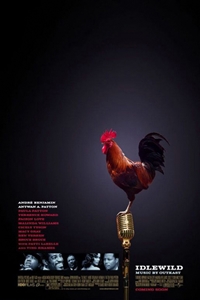Idlewild (R) ★★
 Idlewild goes for broke and often gets there. But it’s an absolutely beautiful disaster, one with no shortage of talent, ambition or future stars, both in front of and behind the lens.
Idlewild goes for broke and often gets there. But it’s an absolutely beautiful disaster, one with no shortage of talent, ambition or future stars, both in front of and behind the lens.
Story
Life’s never exactly been a walk in the park for Rooster (Antwan Patton) and Percival (Andre Benjamin), even when they were childhood best friends, but things are about to get real messy. Now grown up and living in the 1930s South--Idlewild, Georgia, to be exact--they remain close and even work together. Rooster, the more flamboyant of the two, is the emcee and Percy the piano player at a place called Church, which is “anything but.” Church is a speakeasy beloved by locals, but after a gangster (Terrence Howard) forcibly removes the club’s former owner (Faizon Love), the new regime is considerably tighter, especially for Rooster, who has to answer to the new guy in charge. Rooster is all about business and is concerned about keeping Church in operation. Percy, meanwhile, is torn between love for a woman (Paula Patton) and allegiance for his widower dad (Ben Vereen). But nothing will get resolved before the gunpowder settles.
Acting
As Outkast, Benjamin (a.k.a. Andre 3000) and Patton (a.k.a. Big Boi) have set pop music on fire while maintaining hip-hop cred. In Idlewild, they try to continue that along with taking over a new medium; the results are mixed. Patton, the one with seemingly no aspirations of movie stardom, actually gives the stronger performance of the two. This is just his second film, yet he coolly slides right into this role, one that should’ve entailed more dialogue and less rapping. For Benjamin, he has certainly displayed acting chops before, but his wounded puppy dog Percy does not suit the actor at all. A role with more external drama would seem optimal for him. Benjamin does seem deeply committed to acting, though, so there’s reason to have faith. But it’s Howard, yet again, who absolutely pilfers the show, making everyone look like mere rappers trying to cross over. His Hustle and Flow hype now calmed, Howard proves that he is anything but a one-hit wonder.
Direction
Bryan Barber is Outkast’s go-to music-video director who’s making his feature debut with Idlewild; both of those facts speak volumes about his writing/directing effort here. As such, the film is loaded with bright spots, usually consisting of the dance sequences and the overall style, and major cinematic blemishes, as can be expected for a first-timer. In other words, the core elements--i.e. the script and direction--are a mess, but the peripheral elements--i.e. the look and sound--are dazzling. Part of the problem is the timing of the release: This film is supposed to do too many things, from launching Benjamin into movie stardom to coinciding with the actual Outkast album/soundtrack release, and that ambition is a microcosm of the flaws. But most of all, there is simply too much going on here. Anachronisms run rampant where they shouldn’t, and the same can be said for some of the songs--the vulgar rap played against the film’s Southern themes doesn’t always quite work, as the intended contrast is sometimes overbearing.
Bottom Line
Hollywood.com rated this film 2 stars.
To get the full Quicklook Films experience, uncheck "Enable on this Site" from Adblock Plus
box office top 10

Civil War Released: April 12, 2024 Cast: Kirsten Dunst, Wagner Moura 25.7M

Godzilla x Kong: The New Empire Released: March 29, 2024 Cast: Rebecca Hall, Brian Tyree Henry 15.5M

Ghostbusters: Frozen Empire Released: March 22, 2024 Cast: Paul Rudd, Carrie Coon 5.8M

Kung Fu Panda 4 Released: March 8, 2024 Cast: Jack Black, Viola Davis 5.5M

Dune: Part Two Released: March 1, 2024 Cast: Timothée Chalamet, Rebecca Ferguson 4.3M

Monkey Man Released: April 5, 2024 Cast: Dev Patel, Sikandar Kher 4.1M

The First Omen Released: April 5, 2024 Cast: Nell Tiger Free, Bill Nighy 3.8M

The Long Game Released: April 12, 2024 Cast: Dennis Quaid, Gillian Vigman 1.4M

Shrek 2 Released: May 19, 2004 Cast: Mike Myers, Eddie Murphy 1.4M

Sting Released: April 12, 2024 Cast: Alyla Browne, Ryan Corr 1.2M






